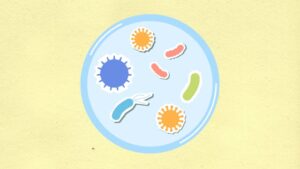Gastroesophageal reflux (GER) is a common digestive issue in children, characterized by the backflow of acidic stomach contents into the esophagus, causing discomfort and other symptoms. Medications can effectively alleviate these symptoms. This guide introduces common medications, their side effects, and long-term safety considerations to help parents manage this condition better.
Common Medications
H2 Receptor Antagonists
Function: H2 receptor antagonists work by reducing stomach acid production, providing relief from reflux symptoms. Common options include ranitidine and famotidine. These drugs block H2 receptors on stomach lining cells, lowering acid production.
Indications: These medications are generally prescribed for mild to moderate GER symptoms, especially for occasional reflux or symptoms occurring after meals.
Proton Pump Inhibitors (PPIs)
Function: Proton pump inhibitors (PPIs) are more potent in reducing stomach acid production. Popular choices include omeprazole, lansoprazole, and esomeprazole. They inhibit proton pump activity in the stomach, significantly decreasing acid levels.
Indications: PPIs are typically used for moderate to severe GER symptoms or when other treatments have not been effective.
Side Effects and Long-Term Safety
Side Effects
- H2 Receptor Antagonists: Common side effects include headaches, dizziness, diarrhea, or constipation. Rarely, they may cause allergic reactions or interfere with the metabolism of other drugs.
- Proton Pump Inhibitors (PPIs): Side effects may include nausea, vomiting, diarrhea, or constipation. Long-term PPI use can lead to vitamin B12 deficiency, osteoporosis, or increased susceptibility to intestinal infections due to reduced acid levels affecting nutrient absorption.
Long-Term Safety
- H2 Receptor Antagonists: Long-term use is considered relatively safe, but dosage adjustments should always follow medical advice.
- Proton Pump Inhibitors (PPIs): Regular monitoring is recommended during extended use, particularly in children. Doctors may advise checks on nutritional status and bone density to ensure no adverse effects arise.
FAQs
- Can children outgrow gastroesophageal reflux?
Yes, many children outgrow GER as their digestive system matures, particularly by their first birthday. - Is medication always necessary for GER in children?
Not always. Mild cases can often be managed with dietary and lifestyle adjustments. Medications are generally reserved for moderate to severe cases. - How long can my child safely take PPIs?
While short-term use is generally safe, long-term use should be monitored by a healthcare provider to mitigate potential side effects. - Are there non-drug options to help manage GER symptoms?
Yes, dietary changes, positioning strategies, and smaller, more frequent meals can help manage symptoms in many cases. - When should I consult a doctor about my child’s GER symptoms?
If symptoms are severe, persistent, or accompanied by weight loss, feeding difficulties, or respiratory issues, consult a healthcare provider promptly.
Key Takeways
Medications such as H2 receptor antagonists and proton pump inhibitors are effective tools for managing pediatric GER symptoms. While generally safe, long-term use requires careful monitoring to avoid potential side effects. Parents should collaborate closely with healthcare providers to develop a tailored treatment plan for their child, ensuring both safety and effectiveness.
References
Rosen, R., et al. "Pediatric Gastroesophageal Reflux Clinical Practice Guidelines: Joint Recommendations of NASPGHAN and ESPGHAN." Journal of Pediatric Gastroenterology and Nutrition, 2018.
National Institute of Diabetes and Digestive and Kidney Diseases (NIDDK). "Gastroesophageal Reflux (GER) and GERD in Children and Teens."
Mayo Clinic. "GERD in Children."
American Academy of Pediatrics (AAP). "Gastroesophageal Reflux: Management and Treatment."
Gupta, S. K., et al. "Efficacy and Safety of Proton Pump Inhibitors in Pediatric Gastroesophageal Reflux Disease." Clinical Gastroenterology and Hepatology, 2021.
Tighe, M., et al. "Pharmacological Treatment of Pediatric Gastroesophageal Reflux Disease." Journal of Pediatric Gastroenterology and Nutrition, 2015.













